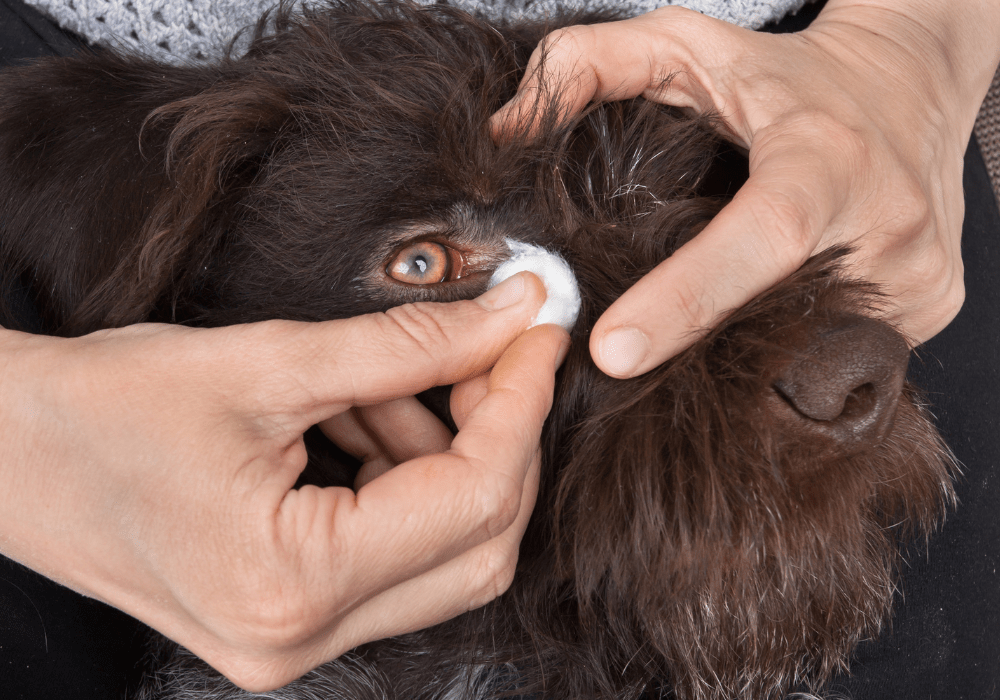Dog Conjunctivitis: Symptoms & Treatment

If you suspect your dog is suffering from a case of conjunctivitis, here’s what you need to know. From causes to symptoms and treatment options, we’ve got you covered.
What is Conjunctivitis in Dogs?
Dog conjunctivitis, commonly referred to as pink eye, is a condition characterized by the inflammation of the conjunctiva, the thin, transparent membrane that covers the front part of the eyeball and lines the eyelid. The conjunctiva serves as a protective barrier for the eye, shielding it from dirt and bacteria. If you think your pet has conjunctivitis, it’s crucial to consult our doctors at Willow Glen Pet Hospital as soon as possible, since some causes can progress rapidly.
What Are the Symptoms of Dog Conjunctivitis?
While humans can quickly identify symptoms of conjunctivitis, dogs may exhibit less obvious signs, especially if their eyes are partially obscured by long hair. Here are some common symptoms to watch for:
- Eye discharge (yellow or green)
- Squinting
- Watery eyes
- Eyelids that stick together
- Excessive blinking
- Rubbing their eyes
- Swollen eyelids
These symptoms may be accompanied by cold-like signs, such as a runny nose, indicating a potential viral cause.
What Causes Conjunctivitis in Dogs?
Dogs are naturally curious creatures, exposing themselves to various irritants and pathogens that can lead to conjunctivitis. Common causes include:
- Irritation from foreign objects (often hidden under the eyelids)
- Environmental pollutants (smoke, dust, mold)
- Dry eyes (insufficient tear production)
- Allergies
- Other ocular issues (glaucoma, tumors)
- Injuries to the eye area
- Irritating shampoos
- Ingrown eyelids or hairs
- Bacterial infections
- Viral infections
- Mites affecting the skin around the eyes
Determining the underlying cause of conjunctivitis is essential for effective treatment, so it’s best to consult our doctors for a thorough examination.
How to Treat Conjunctivitis in Dogs
Treatment for conjunctivitis varies greatly depending on the cause. Your veterinarian will first need to identify the trigger before recommending a treatment plan. Possible treatments may include:
- Removal of foreign objects: If a foreign body is present, your vet might need to sedate your dog to safely extract it.
- Medication: For bacterial or viral conjunctivitis, antibiotics or antiviral medications will be prescribed.
- Allergy management: If allergies are worsening the condition, antihistamines or steroids in the form of tablets or eye drops may be necessary.
- Lubrication: If your dog struggles with dry eyes, your vet may recommend special eye drops or ointments to alleviate irritation.
Should You Go to the Vet if You Suspect Your Dog Has Conjunctivitis?
Absolutely. You should consult our doctors at Willow Glen Pet Hospital as soon as you notice symptoms of conjunctivitis in your dog. Ignoring these signs can lead to worsening conditions and potential vision problems.
Things to Avoid if Your Dog Has Conjunctivitis
- Don’t Use Eye Drops Meant for Humans: Human eye drops can be harmful to dogs. Always consult with a veterinarian before administering any medication.
- Don’t Forget to Wash Your Hands: Keep your hands clean to avoid introducing further irritants or bacteria to your dog’s eyes.
How to Prevent Conjunctivitis in Dogs
While it’s impossible to completely prevent conjunctivitis, you can minimize risks by:
- Keeping vaccinations up-to-date: Vaccines help protect against viruses that can lead to infectious conjunctivitis.
- Avoiding irritants: Be aware of the chemicals and allergens in your dog’s environment.
- Using a dog cone: If your dog is experiencing symptoms, a cone can prevent them from rubbing their eyes and worsening the condition.
Can Conjunctivitis Be Passed From Dog to Human?
While rare, humans can contract conjunctivitis from their dogs, and vice versa. If you have conjunctivitis, ensure you wash your hands before interacting with your pet to reduce the risk of transmission.
If you need more help or have any questions, call us at Willow Glen Pet Hospital, (669) 342-7472, 1033 Willow Street, San Jose, CA, 95125, US
**Hours:**
Monday – Saturday 8:00 am – 6:00 pm
This comprehensive overview on dog conjunctivitis should help you identify symptoms and understand treatment options. Always consult your veterinarian for personalized advice and care.
